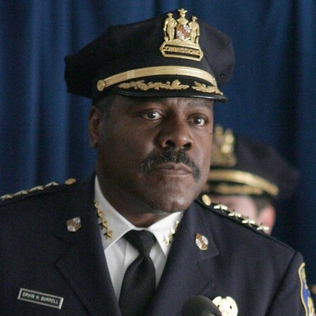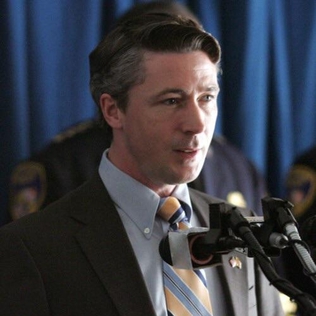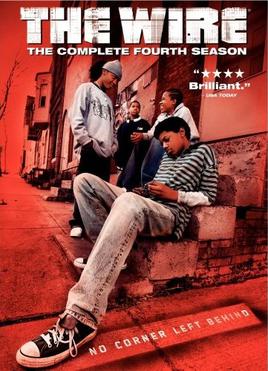
Cedric Daniels is a fictional character on the HBO drama The Wire, portrayed by Lance Reddick. Daniels is well-regarded in the Baltimore Police Department for making his subordinates focus on decent police work and quality arrests. He occasionally has disagreements with higher-ranking officers but for the most part performs well, and has thereby gained a reputation as both a reliable commander and an above-average investigator within the force, in stark contrast to some of his superiors and peers, most of whom display varying degrees of corruption and unreliability.
"Time After Time" is the first episode of the third season of the HBO original series The Wire. The episode was written by David Simon from a story by David Simon & Ed Burns and was directed by Ed Bianchi. It originally aired on September 19, 2004.
"Homecoming" is the sixth episode of the third season of the HBO original series The Wire. The episode was written by Rafael Alvarez from a story by David Simon & Rafael Alvarez and was directed by Leslie Libman. It originally aired on October 31, 2004.
"Back Burners" is the seventh episode of the third season of the HBO original series The Wire. The episode was written by Joy Lusco from a story by David Simon & Joy Lusco and was directed by Tim Van Patten. It originally aired on November 7, 2004.

Ervin H. Burrell is a fictional character on the HBO drama The Wire, played by Frankie Faison. Burrell was an officer in the Baltimore Police Department who ascended from Deputy Commissioner of Operations to Commissioner over the course of the show.

William A. "Bill" Rawls is a fictional character on the HBO drama The Wire, played by actor John Doman. Over the course of the series, Rawls ascends through the higher ranks of the Baltimore Police Department, eventually becoming Deputy Commissioner of Operations and, at the end of Season 5, Superintendent of the Maryland State Police.

Howard "Bunny" Colvin is a fictional character on the HBO drama The Wire, played by actor Robert Wisdom. Colvin is a wise and able police major in the Baltimore's Western District, alienated by the careerism and bureaucracy rampant in the Baltimore Police Department and the detrimental social effects of the War on Drugs. Close to retirement, he secretly breaks chain of command and puts his resources into "Hamsterdam," three zones within his district where drug dealers are pressured to non-violently congregate in exchange for informal legal sanction.

Stanislaus "Stan" Valchek is a fictional character on the HBO drama The Wire, played by actor Al Brown.
"Slapstick" is the ninth episode of the third season of the HBO original series The Wire. The episode was written by David Simon from a story by David Simon & George Pelecanos and was directed by Alex Zakrzewski. It originally aired on November 21, 2004.
"Reformation" is the tenth episode of the third season of the HBO original series The Wire. The episode was written by Ed Burns from a story by David Simon & Ed Burns and was directed by Christine Moore. It originally aired on November 28, 2004.
"Middle Ground" is the 11th episode of the third season of the HBO original series The Wire. The episode was written by George Pelecanos from a story by David Simon & George Pelecanos and was directed by Joe Chappelle. It originally aired on December 12, 2004. The episode was nominated for the Primetime Emmy Award for Outstanding Writing for a Drama Series.
"Mission Accomplished" is the 12th and final episode of the third season of the HBO original series The Wire. The episode was written by David Simon from a story by David Simon & Ed Burns and was directed by Ernest Dickerson. It originally aired on December 19, 2004.

Thomas J. "Tommy" Carcetti is a fictional character on the HBO drama The Wire, played by Aidan Gillen. Carcetti is an ambitious and venal Baltimore politician who begins the series with a seat on the city council.
"Soft Eyes" is the second episode of the fourth season of the HBO original series The Wire. Written by David Mills from a story by Ed Burns & David Mills, and directed by Christine Moore, it originally aired on September 17, 2006.
"Alliances" is the fifth episode of the fourth season of the HBO original series The Wire. Written by Ed Burns with a story by David Simon & Ed Burns, and directed by David Platt, it originally aired on October 8, 2006.
"Margin of Error" is the sixth episode of the fourth season of the HBO original series The Wire. Written by Eric Overmyer from a story by Ed Burns & Eric Overmyer, and directed by Dan Attias, it originally aired on October 15, 2006.
The following are politicians, family members, and assistants administrating the politics of Baltimore on The Wire.
Law enforcement is an integral part of the HBO drama series The Wire. The show has numerous characters in this field and their roles range from those enforcing the law at street level up to those setting laws citywide. The Baltimore City Police Department has been explored in detail from street level characters to the upper echelons of command. The show has also examined those setting laws in city politics and touched upon the FBI, the correctional system and the family of police officers.

Rhonda Pearlman is a fictional character on the HBO drama The Wire, played by actress Deirdre Lovejoy. Pearlman has been the legal system liaison for all of Lieutenant Cedric Daniels' investigations on the show. Later in the series, she begins a relationship with Cedric Daniels.

The fourth season of the television series The Wire commenced airing in the United States on September 10, 2006, concluded on December 10, 2006, and contained 13 episodes. It introduces Baltimore's school system and several middle school students while continuing to examine the remnants of the Barksdale Organization, the ascendant Stanfield Organization, the Baltimore Police Department and politicians.








